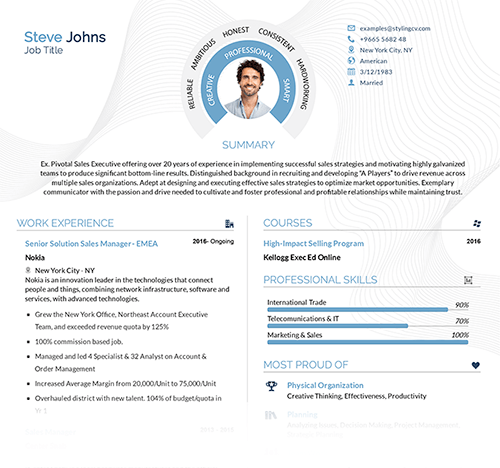Optimize your resume with AI-driven keywords to thrive in the 2025 job market. Discover how to leverage the latest trends in resume writing.
james
Content Specialist
I’m James Walker, a Career Development Expert at StylingCV, where I work with professionals to craft resumes that highlight their unique strengths and achievements.With years of experience in recruitment and career coaching, I understand what employers look for — and how to help job seekers present themselves with confidence. My work focuses on blending clear communication, smart design, and practical advice to create resumes that truly make an impact.At StylingCV, I collaborate with our creative team to make sure every resource we produce helps users take meaningful steps toward their career goals. Outside of work, I enjoy mentoring young professionals and writing about emerging trends in personal branding and workplace development.
Sources & References
- ✓ Career development best practices from leading HR associations
- ✓ Industry research and surveys
- ✓ Expert interviews and case studies
- ✓ Verified by professional career advisors
Last updated: November 13, 2025
Optimize Your Resume with AI-Powered Keywords in 2025
Optimize your resume with AI-driven keywords to thrive in the 2025 job market. Discover how to leverage the latest trends in resume writing.
james
Content Specialist
In today’s job market, a well-crafted resume is key to standing out. AI resume builders let you make a keyword-rich resume content for each job. This boosts your chances of catching the eye of recruiters and hiring managers.
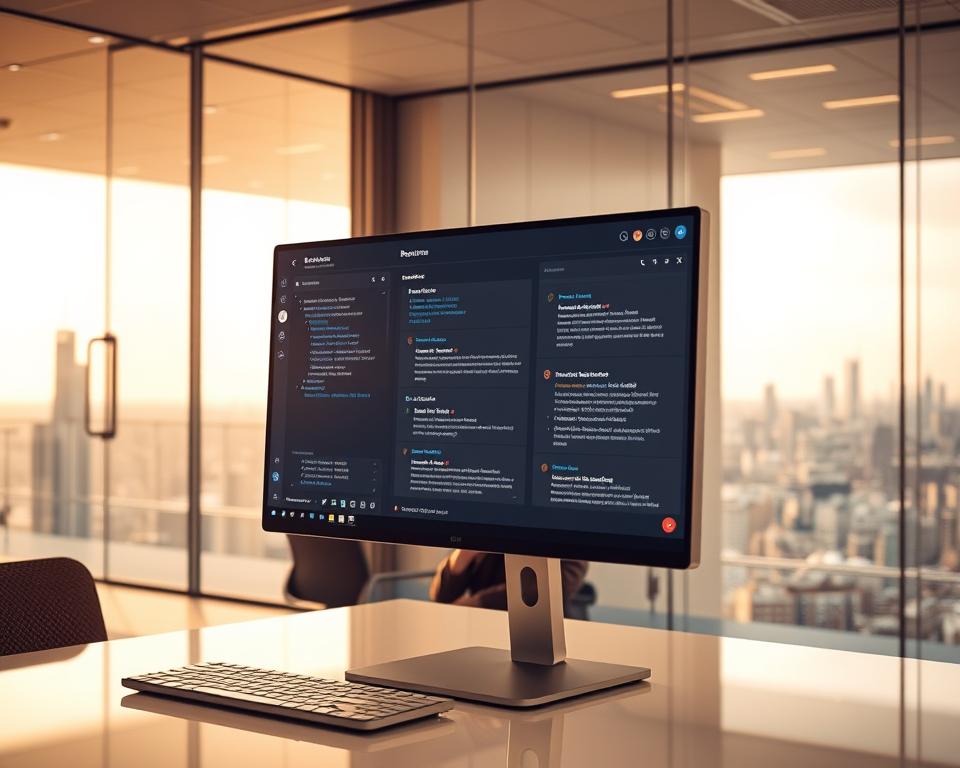
AI is changing how we write resumes. It offers tools to tailor your resume for each job, helping you beat ATS and impress hiring managers. As we head into 2025, knowing SEO for resumes and the latest job market trends will be crucial for finding a job.
Key Takeaways
- Understand the importance of AI-powered keywords in resume optimization.
- Learn how to leverage AI resume builders to create a competitive resume.
- Stay ahead in the 2025 job market with the latest trends in resume writing.
- Discover the role of SEO in creating keyword-rich resume content.
- Optimize your resume for applicant tracking systems (ATS).
Understanding the Importance of Resume Keywords
To stand out in a crowded job market, knowing how resume keywords work is key. These are the words or phrases recruiters and hiring managers look for. They help filter resumes through Applicant Tracking Systems (ATS).
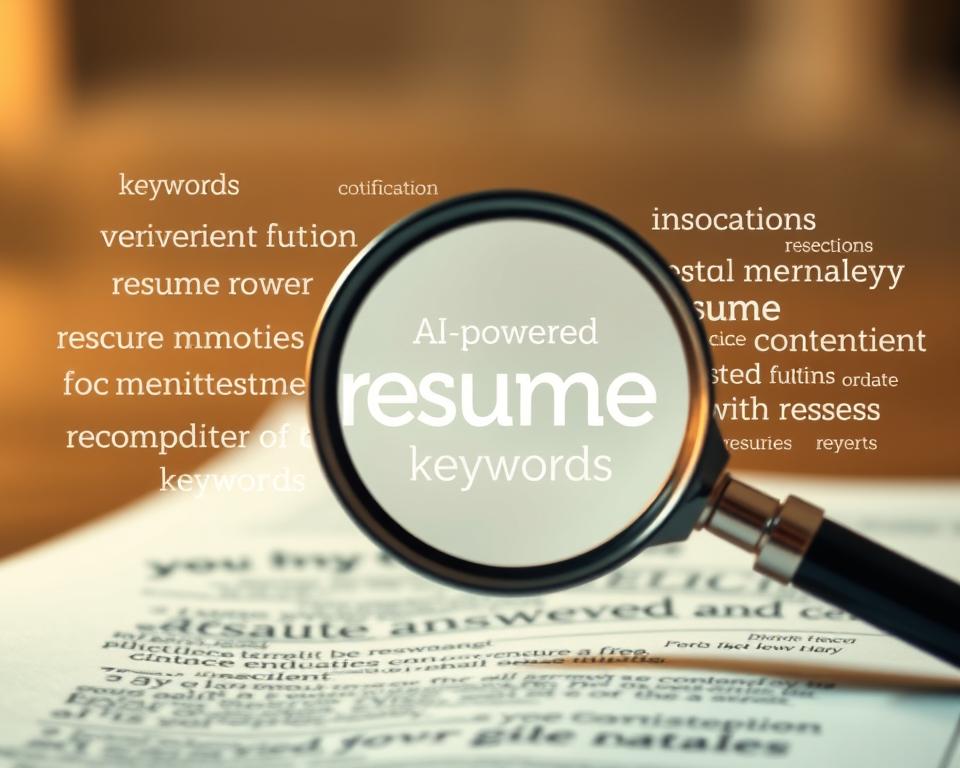
What Are Resume Keywords?
Resume keywords are the terms used by hiring managers and recruiters to find candidates. They include industry-specific buzzwords, technical skills, and soft skills. For example, a data scientist resume might include “machine learning,” “Python programming,” and “data analysis.”
By adding these keywords to your resume, you boost your chances of getting noticed by ATS and hiring managers.
Learn more about resume keywords and how to use them from this article. It offers tips on optimizing your resume with the right keywords.
Why Keywords Matter in Job Applications
Using the right keywords in your resume is vital for several reasons. Many companies use ATS to filter resumes, and these systems look for keywords. Keywords also help your resume show up in search results when hiring managers are looking for specific skills. Lastly, using the right keywords shows you’re a good fit for the job, increasing your chances of being considered.
To make your resume effective, find a balance in keyword density. Use keywords often enough to be noticed but not so much it looks unnatural. Aim for a keyword density of 1-2%, meaning 1-2% of your resume should be keywords.
By understanding and using resume keywords well, you can greatly improve your job search success.
The Role of AI in Resume Writing
In 2025, AI is changing how we write resumes. AI resume builders are becoming key in making resumes pop in a crowded job market.
AI in job applications is more than a trend. It’s a big change in how employers see and process resumes. AI helps your resume get past Applicant Tracking Systems (ATS) easily, so it reaches real people.
How AI is Changing Resume Writing in 2025
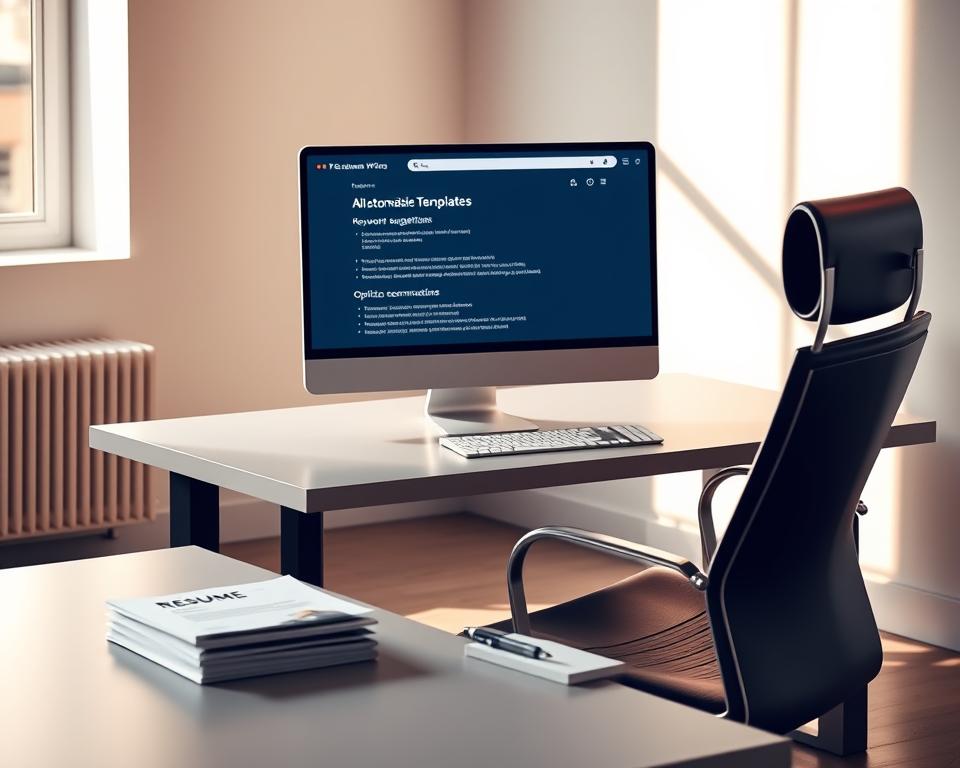
In 2025, AI will make resume writing even better. It will offer advanced resume optimization techniques. These tools help you make resumes that really show off your skills and fit the job perfectly.
AI in resume writing does more than just add keywords. It can look at job descriptions and suggest ways to make your resume better. This makes your resume more likely to get you an interview.
Benefits of AI Resume Builders
What’s good about AI resume builders? They save you time by writing your resume for you. They also make your resume more relevant by adding the right keywords and phrases for your field.
- Enhanced keyword optimization for ATS compatibility
- Personalized resume content based on job descriptions
- Time-saving automation of the resume writing process
Using these benefits, you can make a resume that really catches the eye. And it will clearly show what you bring to the table for employers.
Key Resume Keywords for 2025 Job Market Trends
To stay ahead in the 2025 job market, knowing the right resume keywords is key. The job market changes fast, and what’s important today might not be tomorrow. Using the right keywords in 2025 can make your resume more visible to employers.
Industry-Specific Keywords
Industry-specific keywords show your skills in a specific area. For tech jobs, for example, keywords like programming languages and AI are important. To find the best keywords for your field, do the following:
- Look at job ads in your field
- Read industry reports and trends
- Check LinkedIn to see what keywords others use

Soft Skills vs. Hard Skills
It’s important to know the difference between soft skills and hard skills. Soft skills help you work with others, like communication and teamwork. Hard skills are specific skills you learn, like programming or data analysis.
To make a good resume, mix both soft and hard skills. For example:
| Skill Type | Examples |
|---|---|
| Soft Skills | Leadership, Time Management, Adaptability |
| Hard Skills | Python Programming, Data Analysis, Digital Marketing |
By including both soft and hard skills in your resume, you can stand out in the 2025 job market trends.
Integrating AI Resume Builders into Your Job Search
To stand out in the 2025 job market, using AI resume builders is key. These tools help you make a resume that shows off your skills and meets job requirements.
How to Use AI in Job Applications
AI in job applications is more than just making a resume. It’s about analyzing job descriptions and tailoring your application. AI resume builders suggest keywords, improve structure, and generate content based on your input.
To use AI in your job search, follow these steps:
- Find job postings that fit your skills and experience.
- Use an AI resume builder to analyze these job postings and find key phrases and keywords.
- Put your information into the AI tool to create a tailored resume.
- Review and refine the resume to make sure it shows your experiences and skills well.
Top AI Resume Builders for 2025
Choosing the right AI resume builder can be tough. Here are the top AI resume builders for 2025, along with their main features:
| AI Resume Builder | Key Features | Price |
|---|---|---|
| StylingCV AI Resume Builder | AI-powered keyword optimization, customizable templates, real-time feedback | Free registration, with premium features starting at $9.99/month |
| ResumeGenius | AI-driven content suggestions, extensive template library, detailed analytics | $12.95/month (basic plan) |
| Resume-io | AI-based resume scoring, real-time editing, collaboration tools | $14.99/month (premium plan) |
When picking an AI resume builder, look at its job description analysis, keyword suggestions, and customization options.
Using AI resume builders can boost your job search success in 2025. Start with StylingCV AI Resume Builder – Free Registration to create a standout resume.
Crafting a Keyword-Rich Resume
To stand out in the job market of 2025, your resume must be more than a work history. It should be a strategic, keyword-rich document. This means analyzing the job description and using keywords that match the employer’s needs.
Identifying Relevant Keywords
Finding the right keywords is key for a keyword-rich resume. You must study job descriptions to find the employer’s key terms and phrases. Keyword research is a vital step. You can use tools and methods to find relevant keywords, such as:
- Job descriptions and job postings
- Industry-specific terminology
- Keyword research tools and databases
By adding these keywords naturally to your resume, you boost your chances of getting past Applicant Tracking Systems (ATS) and catching the hiring manager’s attention.
Placement and Frequency of Keywords
After finding the right keywords, place them strategically in your resume. The placement and frequency of these keywords are key for resume optimization. Here are some tips:
- Summary/Objective Statement: Start your resume with a summary or objective statement that includes your target keywords.
- Work Experience: Add keywords to your work experience section, especially in job titles, company names, and job descriptions.
- Skills Section: Use keywords related to your skills, certifications, and qualifications.
- Education: Include relevant course names or specializations.
Remember, the goal is to blend these keywords naturally. Avoid keyword stuffing, as it can make your resume look spammy and may be flagged by ATS.
By carefully crafting a keyword-rich resume, you improve your chances of success in the competitive job market of 2025. Your resume will be more visible to employers and better at showing your qualifications and experience.
Enhancing Your Resume with Action Verbs
Your resume needs action verbs to describe your achievements well. Action verbs make your resume lively and interesting for hiring managers. By choosing the right verbs, you can boost your resume’s impact and show off your skills and experiences.
Powerful Action Verbs to Include
To make your resume pop, use strong action verbs that match your achievements. Here are some effective verbs to consider:
- Managed a team of 10 people, improving productivity by 25%
- Created a new marketing strategy, resulting in a 30% increase in sales
- Developed and implemented a new software solution, reducing processing time by 40%
- Enhanced customer satisfaction by improving response times by 50%
These verbs help you describe your achievements better and make your resume more appealing.
Minimizing Common Mistakes
It’s key to use action verbs but also to avoid common errors. Here are some mistakes to steer clear of:
| Mistake | Correction |
|---|---|
| Using passive voice | Use active voice instead, e.g., “Managed a team” instead of “Team was managed by me” |
| Repeating the same verbs | Vary your action verbs to keep the content engaging, e.g., “Created,” “Developed,” “Enhanced” |
| Omitting action verbs altogether | Ensure every bullet point starts with a strong action verb |
Avoid these mistakes and use powerful action verbs to make your resume more effective. This will grab the attention of hiring managers.
Optimizing Your LinkedIn Profile with Keywords
In 2025, having a strong online presence is key. Making your LinkedIn profile keyword-rich is vital for recruiters to find you. A strong digital footprint is crucial for career growth.
Adding the right keywords to your LinkedIn profile boosts your visibility. It also makes your profile match your resume, creating a unified professional image.
Importance of LinkedIn Keywords
LinkedIn keywords help recruiters find you. Use industry-specific terms in your profile to stand out. For example, if you’re in data science, include “machine learning,” “data analysis,” and “AI in job applications.”
To make your LinkedIn profile work better, try these tips:
- Use relevant keywords in your headline and summary.
- Include industry-specific terms in your skills section.
- Highlight your achievements with action verbs and keyword-rich phrases.
Synchronizing Your Resume and Profile
Keeping your resume and LinkedIn profile in sync is important. Use the same keywords in both to strengthen your professional brand. This boosts your visibility across platforms.
To sync them, follow these steps:
- Find key keywords in your resume and add them to your LinkedIn profile.
- Make sure your LinkedIn headline and summary match your resume.
- Use the same formatting and terms in both your resume and LinkedIn profile.
Aligning your resume and LinkedIn profile boosts your job search. As AI becomes more important in recruitment, a keyword-optimized LinkedIn profile can help you get noticed.
A study shows recruiters prefer profiles with relevant keywords. One recruiter said, “A well-optimized LinkedIn profile is like a digital resume; it’s crucial for a strong first impression.”
“In the digital age, your LinkedIn profile is often the first point of contact with potential employers. Make sure it’s optimized to showcase your skills and experience.”
| Keyword Type | Resume Placement | LinkedIn Placement |
|---|---|---|
| Industry-specific keywords | Skills section, Work experience | Skills section, Headline, Summary |
| Action verbs | Work experience, Achievements | Summary, Work experience |
| Soft skills | Summary, Skills section | Summary, Skills section |
Optimizing your LinkedIn profile with keywords and syncing it with your resume boosts your online presence. This increases your job market success chances.
The Future of Resume Writing and AI
AI is changing the game in resume writing. The job market keeps shifting with new tech and employer needs. To keep up, it’s key to know the latest trends and adjust your resume strategies.
Innovations to Expect in 2025
In 2025, AI resume tools will get even smarter. They’ll do better keyword analysis, create more content, and personalize resumes. AI will also get better at matching resumes with job postings.
Key innovations to watch out for include:
- Advanced keyword clustering: AI will find and group key words better, making resumes more visible.
- Personalized content generation: AI will craft resumes that fit your profile and the job you’re applying for.
- Predictive job matching: AI will guess how likely you are to get shortlisted based on past data and job needs.
Preparing for Changing Job Market Trends
To stay ahead, you need to predict and prepare for job market shifts. This means understanding what employers want and the skills they need. Use AI to make your resume fit these new demands.
Strategies to prepare for changing job market trends include:
- Keep up with industry reports and forecasts.
- Use AI resume builders to improve your resume.
- Keep learning new skills that employers want.
Analyzing Your Resume for Keywords
To make your resume better, you need to find and use the right keywords. This means looking for keywords that match the job you want. Keyword analysis tools can help by showing you the most used keywords in your field.
There are many tools to help you check your resume for keywords. These tools give feedback on how well you use keywords. They help you make your resume better based on data.
Tools for Keyword Analysis
Many keyword analysis tools can help you improve your resume. Some well-known ones are:
- Resume-io: It tells you how you’re doing with keywords and suggests ways to get better.
- Rezi: It checks your resume for keywords and if it works with ATS systems. Learn more about using these tools in our post on ATS Resume Keywords.
- Resume Companion: It has a feature to analyze your resume’s keywords.
Making Adjustments Based on Feedback
After using keyword analysis tools, you should change your resume based on what you learn. You might need to:
- Add keywords that fit the job, especially in your summary, skills, and work history.
- Take out or change keywords that don’t match the job you’re applying for.
- Adjust how often you use keywords to keep it just right.
By making these changes, your resume will work better. It will be more likely to pass ATS checks and catch the attention of hiring managers.
For more tips on making a great resume, check out our collection of top resume templates here.
Resources for Building an Effective Resume
To make a professional resume, you need the right tools. Use high-quality resume templates to make your resume look great. Tools like StylingCV help your resume stand out.
Explore Resume Templates
Check out our collection of top-notch resume templates. Find the one that matches your job application needs. These templates are both good-looking and easy to change.
Get Started with StylingCV AI Resume Builder
Start making your professional resume with StylingCV AI Resume Builder. It’s free to sign up. Begin building your resume and boost your job search chances.
FAQ
What are resume keywords, and why are they important?
Resume keywords are terms used by hiring managers and recruiters to find candidates. They are key because they help your resume get past ATS and catch the hiring manager’s eye.
How does AI help in resume writing?
AI makes resume writing easier by looking at job descriptions, suggesting keywords, and creating content for the job you’re applying for.
What is the difference between soft skills and hard skills?
Soft skills are personal traits that help you work with others. Hard skills are specific abilities you learn through education or training.
How can I identify relevant keywords for my resume?
To find relevant keywords, analyze job descriptions. Look for key terms and phrases the employer uses.
Why is it important to synchronize my resume and LinkedIn profile?
Matching your resume and LinkedIn profile makes your professional brand consistent. It boosts your chances of being seen by recruiters.
What are the benefits of using AI resume builders?
AI resume builders save time and make your resume more relevant. They also increase your chances of being noticed by recruiters.
How can I optimize my LinkedIn profile with keywords?
To optimize your LinkedIn profile, use the same keywords as in your resume. Focus on your headline, summary, and skills section.
What is the future of resume writing in relation to AI?
The future of resume writing is linked to AI advancements. We can expect better keyword analysis, content generation, and personalization.
How can I analyze my resume for keywords?
To analyze your resume for keywords, use tools that check keyword usage, density, and relevance.
What resources are available for building an effective resume?
There are many resources, like high-quality resume templates and AI tools like StylingCV. They help you make a professional and effective resume.
Frequently Asked Questions
james
Content Specialist
I’m James Walker, a Career Development Expert at StylingCV, where I work with professionals to craft resumes that highlight their unique strengths and achievements.With years of experience in recruitment and career coaching, I understand what employers look for — and how to help job seekers present themselves with confidence. My work focuses on blending clear communication, smart design, and practical advice to create resumes that truly make an impact.At StylingCV, I collaborate with our creative team to make sure every resource we produce helps users take meaningful steps toward their career goals. Outside of work, I enjoy mentoring young professionals and writing about emerging trends in personal branding and workplace development.
Sources & References
- ✓ Career development best practices from leading HR associations
- ✓ Industry research and surveys
- ✓ Expert interviews and case studies
- ✓ Verified by professional career advisors
Last updated: November 13, 2025
⚡ Create Your Resume in Just 5 Minutes
Templates designed by hiring experts. No design skills needed.
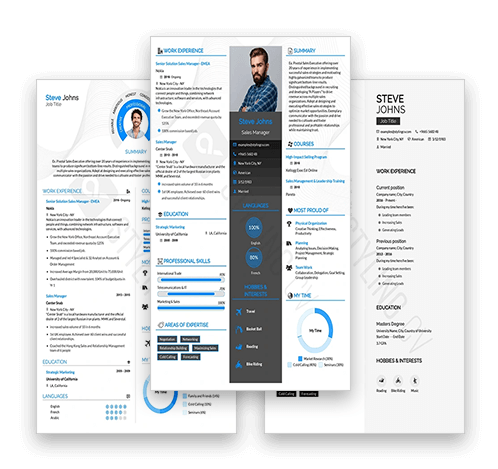 Building Your Resume Now
⭐ 4.8/5 Rating
Building Your Resume Now
⭐ 4.8/5 Rating
3,000+ Success Stories


